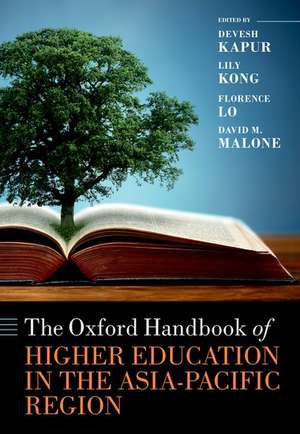The Oxford Handbook of Higher Education in the Asia-Pacific Region: Oxford Handbooks
Editat de Devesh Kapur, Lily Kong, Florence Lo, David M. Maloneen Limba Engleză Hardback – 26 ian 2023
Din seria Oxford Handbooks
-
 Preț: 236.89 lei
Preț: 236.89 lei - 15%
 Preț: 358.80 lei
Preț: 358.80 lei - 17%
 Preț: 912.51 lei
Preț: 912.51 lei - 12%
 Preț: 307.94 lei
Preț: 307.94 lei - 25%
 Preț: 829.05 lei
Preț: 829.05 lei - 14%
 Preț: 987.01 lei
Preț: 987.01 lei - 26%
 Preț: 1376.97 lei
Preț: 1376.97 lei - 29%
 Preț: 929.22 lei
Preț: 929.22 lei -
 Preț: 303.54 lei
Preț: 303.54 lei - 26%
 Preț: 343.85 lei
Preț: 343.85 lei - 14%
 Preț: 278.15 lei
Preț: 278.15 lei - 29%
 Preț: 930.94 lei
Preț: 930.94 lei - 30%
 Preț: 1065.79 lei
Preț: 1065.79 lei - 15%
 Preț: 357.85 lei
Preț: 357.85 lei -
 Preț: 263.45 lei
Preț: 263.45 lei - 23%
 Preț: 839.79 lei
Preț: 839.79 lei - 16%
 Preț: 264.39 lei
Preț: 264.39 lei - 33%
 Preț: 737.68 lei
Preț: 737.68 lei - 33%
 Preț: 725.45 lei
Preț: 725.45 lei - 26%
 Preț: 342.76 lei
Preț: 342.76 lei - 25%
 Preț: 366.95 lei
Preț: 366.95 lei - 13%
 Preț: 304.72 lei
Preț: 304.72 lei - 16%
 Preț: 263.35 lei
Preț: 263.35 lei - 12%
 Preț: 267.23 lei
Preț: 267.23 lei - 33%
 Preț: 815.51 lei
Preț: 815.51 lei - 13%
 Preț: 346.76 lei
Preț: 346.76 lei - 22%
 Preț: 1095.69 lei
Preț: 1095.69 lei - 29%
 Preț: 931.18 lei
Preț: 931.18 lei - 29%
 Preț: 942.77 lei
Preț: 942.77 lei - 24%
 Preț: 1071.82 lei
Preț: 1071.82 lei - 23%
 Preț: 1052.07 lei
Preț: 1052.07 lei - 21%
 Preț: 863.03 lei
Preț: 863.03 lei - 30%
 Preț: 815.25 lei
Preț: 815.25 lei - 29%
 Preț: 855.42 lei
Preț: 855.42 lei - 30%
 Preț: 842.04 lei
Preț: 842.04 lei - 11%
 Preț: 258.32 lei
Preț: 258.32 lei - 29%
 Preț: 859.51 lei
Preț: 859.51 lei - 29%
 Preț: 1083.61 lei
Preț: 1083.61 lei - 15%
 Preț: 273.41 lei
Preț: 273.41 lei - 30%
 Preț: 818.12 lei
Preț: 818.12 lei - 11%
 Preț: 365.23 lei
Preț: 365.23 lei - 21%
 Preț: 359.87 lei
Preț: 359.87 lei - 13%
 Preț: 264.87 lei
Preț: 264.87 lei - 9%
 Preț: 307.08 lei
Preț: 307.08 lei - 28%
 Preț: 845.79 lei
Preț: 845.79 lei - 23%
 Preț: 855.11 lei
Preț: 855.11 lei - 21%
 Preț: 861.04 lei
Preț: 861.04 lei - 12%
 Preț: 250.34 lei
Preț: 250.34 lei
Preț: 958.14 lei
Preț vechi: 1232.73 lei
-22% Nou
Puncte Express: 1437
Preț estimativ în valută:
183.34€ • 191.96$ • 152.07£
183.34€ • 191.96$ • 152.07£
Carte disponibilă
Livrare economică 10-15 martie
Preluare comenzi: 021 569.72.76
Specificații
ISBN-13: 9780192845986
ISBN-10: 0192845985
Pagini: 976
Dimensiuni: 183 x 253 x 59 mm
Greutate: 1.83 kg
Editura: OUP OXFORD
Colecția OUP Oxford
Seria Oxford Handbooks
Locul publicării:Oxford, United Kingdom
ISBN-10: 0192845985
Pagini: 976
Dimensiuni: 183 x 253 x 59 mm
Greutate: 1.83 kg
Editura: OUP OXFORD
Colecția OUP Oxford
Seria Oxford Handbooks
Locul publicării:Oxford, United Kingdom
Notă biografică
Devesh Kapur is Starr Foundation South Asia Studies Professor at the Paul H. Nitze School of Advanced International Studies (SAIS) at Johns Hopkins University. His recent books include Navigating the Labyrinth: Perspectives on India's Higher Education and The Other One Percent: Indians in America.Lily Kong is President of the Singapore Management University and Lee Kong Chian Chair Professor of Social Sciences. Her research focuses on social and cultural change in Asian cities and she has published widely on topics such as religion, cultural policy, creative industries, smart cities, urban heritage, and education.Florence Lo is the Legal Specialist at the United Nations University (UNU). Prior to joining UNU, she worked as a legal practitioner in Southeast Asia providing legal and regulatory advice across a broad range of practice areas including project financing, banking and security, land and property, and labour and employment law.David Malone is UN Under-Secretary General, Rector of the United Nations University (UNU). Prior to joining UNU he served as President of Canada's International Development Research Centre (2008-2013) and as Canada's High Commissioner to India and non-resident Ambassador to Bhutan and Nepal (2006-2008).
